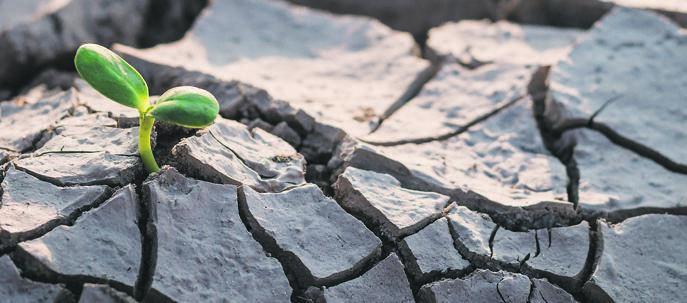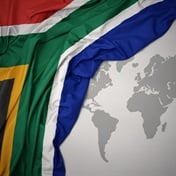
In a small village 45 minutes from the city of Asyut, in southern Egypt, a group of farmers and their families gathered to watch a theatre performance that aimed to find the funny side of the climate crisis. The hourlong comedy, which has so far been performed in 50 villages in the Upper Egypt region, in the country’s south, tells the story of a farmer who refuses to pay for a new, more water-efficient agricultural canal. When a snake bites him and he is thought to be dead, the farmer hears how much his family and neighbours hated him because he rejected modern farming methods. At the end of the show, he changes his perspective.
The play is part of a $7-million (R102.7 million) project, funded by the World Food Programme (WFP) and managed by the Egyptian ministry of agriculture, that aims to help farmers in the region cope better with climate crisis threats through modern technology, sustainable growing techniques and better understanding of climate issues.
Organisers say the project, which started in 2013 and is scheduled to end early next year, has boosted the production of some major crops by at least a third and drastically cut water consumption on the farms involved.
It is one in a series of efforts the Egyptian government has made over the past decade to limit the negative impact of the climate crisis on farmers in the country.
“Community mobilisation on the issue of climate change can encourage many people to embrace the ideas of the project. And theatre is one of the methods to mobilise the community,” said Ayam Abu el-Hagag, an actor in the travelling troupe and also an agricultural advisor.
He noted that each time the troupe delivers a joke on stage, the characters explain the information to make it accessible to all farmers, even those with little or no formal education.
“Comedy helps people understand things more easily,” he added.
HIGHLY VULNERABLE
Climate change has been a major challenge for Egypt and, according to the WFP, “southern Egypt is one of the areas most vulnerable to climate change within the region”.
Read: Climate change: How hot the world will be in 2050
Environmental groups regard Egypt as one of the countries most threatened by the negative effects of the climate crisis, which include sea-level rise, water poverty, and deteriorating public health and ecosystems. The WFP forecasts that Upper Egypt could lose up to 30% of its food production by 2050 as the climate crisis brings more extreme weather and other threats.
Saber Osman, director of the climate change adaptation department at Egypt’s Ministry of Environment, told the Thomson Reuters Foundation that losses could lead to a major crisis for Egypt’s farming sector.
Agriculture represents almost 15% of the country’s gross domestic product and employs about a third of the workforce, he said.
The idea behind the WFP project is to get farmers involved in the frontline fight against climate change and stamp out bad farming habits, said the project’s director, Othman el-Sheikh.
That includes encouraging farmers to plant crop varieties that require less water and follow new irrigation methods to reduce water consumption. Farmers also learn how to combine traditional farming techniques with more modern technology, such as solar-powered irrigation pumps and an app that alerts farmers to incoming weather events.
One main focus for the project is to help farmers work together, to cut the cost of seeds by buying them in bulk and planting them across several neighbouring farms, el-Sheikh explained.
“Fragmented agricultural holdings are common throughout Egypt in general and in Upper Egypt in particular,” he said.
When they work independently, many farmers cannot afford to access high-quality resources, which lowers their productivity and leads to about 10% of land lying fallow, he added.
The initiative helps farmers who agree to pool their resources organise into groups of at least 70.
Every planting season, the Society Development Association in the city of Sahel Selim, which is working with the WFP on the project, buys enough seed for all 70 farmers and divides the seeds equally among them. The farmers carry out the sowing and eventual harvesting together, cutting costs by sharing equipment and manpower, el-Sheikh explained.
The hope is that once the project ends, the farmer groups will be making enough revenue to allow them to buy high-quality seeds for themselves, he said, adding that almost 2 000 farms have been consolidated into larger farming groups through the project in the past three years.
FINANCIAL INDEPENDENCE
The WFP project also runs a loan programme that provides villagers with goats and ducks to give them an alternative source of income in case their crops fail.
Sabrine Haridi, a 33-year-old mother of four children in Sahel Selim, said she received a loan to acquire 38 ducks, which allow her to cover the family’s expenses, even in seasons when her husband’s wheat harvest falls short. She sells some of the ducks for their meat and rears more from eggs, selling them when they mature. Any profit she makes goes towards paying off the loan.
“Two years ago, I was desperate because my husband could not afford our daily needs. I am now financially independent,” she told the Thomson Reuters Foundation.
“When my husband fails to get the expected money from his crop due to climate change, I pay for whatever we need, including food, clothes and school expenses,” she added.
Read: Global warming is our responsibility. We need to bring about change
‘IN GOD’S HANDS’
Since the project was launched in Egypt in 2013, half a million farmers have become involved, said el-Sheikh
He told the Thomson Reuters Foundation that applying the new methods has increased wheat production by 30% to 40%, boosted sugarcane output by about 30% and reduced water consumption by a third.
But getting to that point was not easy, said Osman at the environment ministry.
“Community resistance to adopting methods for coping with climate change is common in Egyptian villages,” he said, adding that some farmers do not see the climate crisis as an issue that can be addressed because it is “in God’s hands”.
El-Sheikh said that some farmers used to ask him, “What would you do to combat climate change? Would you change God’s weather?” He told them the efforts only aimed to help farmers cope with changing weather, not shift the weather itself.
“Convincing farmers to use modern technology and advanced agricultural means and encouraging women to take part in the project are some of the biggest challenges we face,” el-Sheikh explained.
Hassan Bekheet (53) said he didn’t need much convincing to swap his maize crops for drought-tolerant sorghum when he joined the project in Sahel Selim.
Once he made the switch, his crop yield increased by about 25%, as did his revenues, he said, while his costs went down by 15%. He was so happy with what he learnt from the project that he got together with other participants to pass those lessons on to neighbours.
“We are all in the same boat and we should fight these changes together,” Bekheet said. – Thomson Reuters Foundation, the charitable arm of Thomson Reuters, that covers humanitarian news, women’s and LGBTIQ rights, human trafficking, property rights and the climate crisis
 | ||||||||||||||||||||||||||
Get in touchCity Press | ||||||||||||||||||||||||||
| ||||||||||||||||||||||||||
| Rise above the clutter | Choose your news | City Press in your inbox | ||||||||||||||||||||||||||
| City Press is an agenda-setting South African news brand that publishes across platforms. Its flagship print edition is distributed on a Sunday. |




 Publications
Publications
 Partners
Partners








